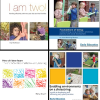Government urged to consider new funding options for early childhood education and care
A coalition of Early Years organisations convened by Kindred2 , including Early Education and providers such as LEYF and Ark Start, has identified a series
We welcome today’s announcement from government that it intends to allocate a further £10m to raise the level of supplementary funding for those maintained nursery schools which currently receive the least – or in some cases none at all.
The statement from government says:
Also announced today is an additional £10 million investment for Maintained Nursery Schools, into the supplementary funding they receive from 2023-24. These settings often care for some of the most disadvantaged children in the country and have additional costs that other early years settings do not – such as the requirement to have a headteacher – because they are constituted as schools.
Since the introduction of the Early Years National Funding Formula in 2017, the government has provided supplementary funding for these nurseries to protect their funding levels.
This additional funding forms part of a separate consultation on plans to reform how early years funding is distributed around England, to ensure the system is fair, effective and responsive to changing levels of need.
As the survey we published last week shows, current levels of funding are insufficient to cover many schools’ core costs and additional funding is urgently needed. The consultation will give the sector an opportunity to feed back to government the extent to which the proposals will address the funding gap, and how they can be best targeted.
However, in relation to other parts of the announcement, the sector has been very clear in its opposition to increasing the ratios of staff to 2-year-old children, and we hope that government will listen to the consultation responses carefully. Post-pandemic, there is a stronger than ever argument for having more, not fewer, adults working with young children, as the level of need is greater than ever for children who were born and led their first years under Covid. Time and attention from high quality practitioners is vital to give each child individualised attention and ensure they make up for any missed experiences during the pandemic that have impacted on their development and learning.
Comparisons with the system in Scotland cannot just involve looking at ratios. The Scottish and English systems have different approaches to staffing qualifications, CPD and inspection, and all of this needs to be taken into account.
Proposals for “Slimming down the childminder specific Early Years Foundation Stage, reducing the framework by one-third to ensure content is targeted and simpler to navigate” are also concerning. Children should be guaranteed the same quality of early childhood education whatever typing of provision they attend, and we would not want to see the quality of childminder provision in any way downgraded.
We urge practitioners to read all these proposals carefully and respond to government with their views.
A coalition of Early Years organisations convened by Kindred2 , including Early Education and providers such as LEYF and Ark Start, has identified a series
We urge members to respond to the two DfE consultations on funding and ratios which close on 16 September. For information, you can view the
The Times Education Commission has today published a report which calls for “A significant boost to early years funding targeted at the most vulnerable and
Government has today published its Schools White Paper “Opportunity for all”. We welcome the fact that early years gets a few mentions: However, the “key
DfE has just published new figures on the number of new entrants to Early Years Initial Teacher Training (EYITT). This is the route that leads to
Organisations representing Maintained Nursery Schools have joined together to warn the government that it must provide a long-term funding solution for Maintained Nursery Schools (MNS)
In response to the growing concerns of its membership related to children and their families living in poverty we asked members, in May last year,






Early Education
2 Victoria Square
St Albans
AL1 3TF
T: 01727 884925
E: office@early-education.org.uk